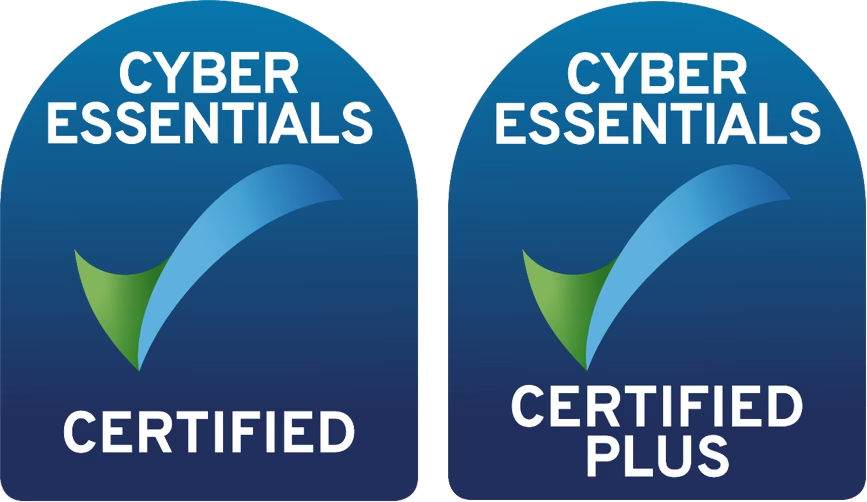Understanding Human Errors in Cyber Security
As the digital landscape is constantly changing, cyber security has become a major challenge for small businesses. They face a high risk of cyber attacks from malicious actors who exploit their vulnerabilities.
Unfortunate as it may be, the United Kingdom has noticed an alarming uptick in the number of small businesses falling prey to cyber-attacks.
While advanced threats and sophisticated hacking methods pose a significant risk, it's surprising to note that most cyber security breaches are due to human error.
In this article, we will delve into the top ten human errors in cybersecurity that small businesses often overlook, offering preventative measures and educating on appropriate responses.

The Top 10 Human Errors That Cause Cyber Security Breaches For Small Businesses
Let's kick things off with an important truth – humans make mistakes. It's our inherent nature.
However, in the realm of cybersecurity, these mistakes can prove costly, especially for small businesses.
From password mismanagement to falling prey to phishing scams, the errors are often simple, yet their repercussions are far-reaching and damaging.
Before we delve into the detailing, it's essential to remember that awareness and education are the first steps towards mitigation.
Here are ten instances of human error in cybersecurity, highlighting common mistakes that can occur :
1. Weak and Reused Passwords
One of the most common human errors is the use of weak or reused passwords across multiple platforms. These easily guessable passwords provide an open door for attackers to gain access to sensitive information.
2. Phishing Scams
Many individuals fall victim to phishing scams, where fraudulent emails or texts appear to come from legitimate sources, tricking individuals into revealing personal information or login credentials.
3. Lack of Two-Factor Authentication
Failing to utilise two-factor authentication (2FA) is another frequent mistake. This added layer of security prevents unauthorised access even if a password is compromised.
4. Misconfigured Security Settings
Often, security settings in software or online platforms are misconfigured, leading to vulnerabilities that cybercriminals can exploit.
5. Unpatched or Outdated Software
Running unpatched or outdated software provides an easy entry point for cybercriminals. Regular updates and patch management are critical for up-to-date security
6. Unsecured Personal Devices
Using personal devices for work without proper security measures can expose sensitive business data to potential threats.
7. Sharing Sensitive Information
Employees often inadvertently share sensitive information, either verbally, via email or on social media, without realising the potential risk.
8. Lack of Employee Training
Without regular and comprehensive cybersecurity training, employees may not be fully aware of the latest threats or understand how to avoid them.
9. Ignoring Suspicious Activity
Ignoring or failing to report suspicious activity on a computer or network can allow a minor threat to escalate into a significant breach.
10. Improper Data Disposal
Finally, improper disposal of data—physical or digital—can lead to sensitive information falling into the wrong hands, posing a serious risk to a business's cybersecurity.
By understanding these common human errors, small businesses can take preventative steps, such as implementing stronger security protocols and providing cybersecurity education to employees.
How To Prevent Human Errors In Cyber Security
Proper education and training hold the key to mitigate the risk of human errors in cybersecurity.
Fostering a culture of security within small businesses in the UK is paramount.
Employees need to be aware of the potential risks and threats, understanding the vital role they play in the organisation's cybersecurity framework.
Remember, a chain is only as strong as its weakest link; in cybersecurity, this often turns out to be human errors.

Tips For Reducing Human Errors In Cyber Security For Small Businesses
In 2023 it becomes increasingly critical for UK business owners to educate their staff about the evolving landscape of cybersecurity.
This ongoing education is the cornerstone of a robust cybersecurity strategy, empowering employees with the knowledge to identify threats and take appropriate actions.
Here are some effective tips to enhance cybersecurity awareness among your staff:
- Regular Training Sessions: Conduct monthly or quarterly cybersecurity training sessions. Update your training curriculum based on the latest threats and include real-world examples.
- Simulated Cyber Attack Drills: Carry out simulated phishing attacks or other threat scenarios. This helps employees understand how these attacks occur in a controlled environment, learning how to react appropriately.
- Informative Newsletters: Send out regular newsletters highlighting recent cyberattacks, new types of threats, and steps to counteract them.
- Reward System: Implement a reward system to encourage employees to report potential threats. This not only boosts morale but also ensures threats are identified promptly.
- Clear Communication Channels: Establish clear and open channels for communication. Employees should feel comfortable reporting potential cyber threats without the fear of repercussions.
- Cybersecurity Policies: Regularly update, communicate, and enforce company-wide cybersecurity policies. These should cover all aspects, from password guidelines to data handling procedures.
Remember, a well-informed team is your best defence against cyber threats. In the battle against cybercrime, knowledge truly is power.

How To Monitor Your Staff and Cyber Security Posture
- Monitoring your staff's digital actions can provide insight into employees' digital activities, helping identify any risky behaviour.
- Software such as Security Information and Event Management (SIEM) systems play a pivotal role, analysing log data in real-time for potential security incidents.
- Endpoint Detection and Response (EDR) solutions can monitor and secure endpoints in real-time, providing a vital layer of defence against cyber threats.
- Regular vulnerability assessments and penetration testing (VAPT) are also important to identify weaknesses in your infrastructure and test your defences against potential attacks.
These measures, combined with an ongoing commitment to employee education and a strong cybersecurity policy, can significantly bolster your company's resilience against cyber threats.
Cultivating a Cyber-aware Workforce is the Ultimate Defence Against Human Error Cyber Threats
In conclusion, the shifting landscape of cyber threats demands constant vigilance and proactive measures from small businesses.
Striving to create a cyber-aware workforce is not an option but an imperative in today's digital age.
By nurturing a culture of security, providing regular education and training, implementing robust security protocols, and leveraging advanced security software, businesses can significantly mitigate the risk of cyber attacks.
Remember, in the realm of cybersecurity, every employee counts, and their knowledge and awareness can be the ultimate defence against cyber threats.
At Speedster IT, we're dedicated to helping you secure your business from cyber threats.
Our team of expert IT professionals provides comprehensive cybersecurity services, including regular staff training, vulnerability assessments, and advanced security solutions deployment.
We work alongside you to cultivate a cyber-aware workforce and implement the necessary measures to protect your business.
With Speedster IT, you're not just getting a service provider—you're getting a cybersecurity partner dedicated to safeguarding your business's future.
Protect Your Business Today
With over 15 years at Speedster IT, I’ve built a career around helping businesses navigate the evolving world of technology. I publish all the content for the IT Support London Blog and Cyber Security Blog, where I share practical insights on infrastructure upgrades, cybersecurity trends, and smart IT strategies for growing companies.
